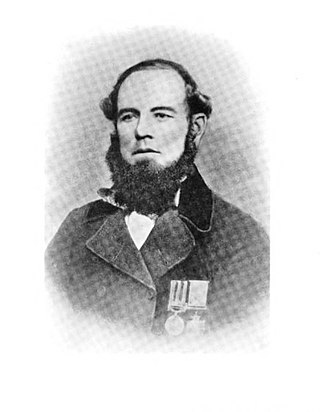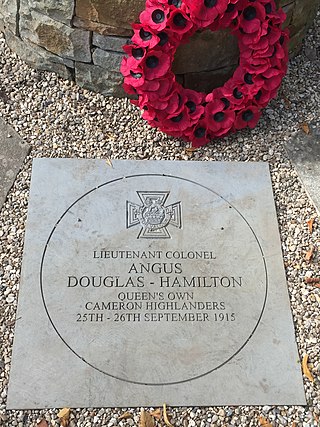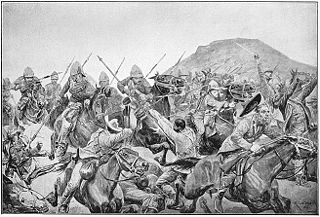
Edward Donald Bellew,, Captain of the 7th Bn British Columbia Regiment, CEF was a Canadian recipient of the Victoria Cross, the highest and most prestigious award for gallantry in the face of the enemy that can be awarded to British and Commonwealth forces.

Eric Norman Frankland Bell VC was an Irish recipient of the Victoria Cross, the highest and most prestigious award for gallantry in the face of the enemy that can be awarded to British and Commonwealth forces. A soldier with The Royal Inniskilling Fusiliers during the First World War, he was posthumously awarded the VC for his actions on 1 July 1916, during the Battle of the Somme.

General Sir Mark Walker was a British Army officer and an Irish recipient of the Victoria Cross, the highest award for gallantry in the face of the enemy that can be awarded to British and Commonwealth forces.

Joseph Ward VC was born in Kinsale, County Cork, and was an Irish recipient of the Victoria Cross, the highest and most prestigious award for gallantry in the face of the enemy that can be awarded to British and Commonwealth forces.

Nathaniel Godolphin Burslem VC, born in Limerick, Ireland; was by birth both Irish and by descent English recipient of the Victoria Cross, the highest and most prestigious award for gallantry in the face of the enemy that can be awarded to British and Commonwealth forces.

James Byrne VC was an Irish recipient of the Victoria Cross, the highest and most prestigious award for gallantry in the face of the enemy that can be awarded to British and Commonwealth forces.

General William Martin Cafe VC was an English recipient of the Victoria Cross, the highest and most prestigious award for gallantry in the face of the enemy that can be awarded to British and Commonwealth forces.

Lieutenant-Colonel Angus Falconar Douglas-Hamilton VC was a Scottish recipient of the Victoria Cross, the highest and most prestigious award for gallantry in the face of the enemy that can be awarded to British and Commonwealth forces.
Colonel Henry Lysons VC CB was a British recipient of the Victoria Cross, the highest and most prestigious award for gallantry in the face of the enemy that can be awarded to British and Commonwealth forces.

Martin Joseph Moffat VC was an Irish recipient of the Victoria Cross, the highest and most prestigious award for gallantry in the face of the enemy that can be awarded to British and Commonwealth forces.

General Sir Edward Pemberton Leach was an Irish recipient of the Victoria Cross, the highest and most prestigious award for gallantry in the face of the enemy that can be awarded to British and Commonwealth forces.

Major Samuel Hill Lawrence VC, born in Cork, was an Irish recipient of the Victoria Cross, the highest and most prestigious award for gallantry in the face of the enemy that can be awarded to British and Commonwealth forces.

George Edward Nurse VC was born in Enniskillen, County Fermanagh, Ireland. He was educated in Guernsey in the Channel Islands where both his parents had been born. He was an Irish recipient of the Victoria Cross, the highest award for gallantry in the face of the enemy that can be awarded to British and Commonwealth forces.

Major General Hamilton Lyster Reed,, was an Irish British Army officer, and recipient of the Victoria Cross, the highest and most prestigious award for gallantry in the face of the enemy that can be awarded to British and Commonwealth forces.

James Owens VC was born in Killaine, Bailieborough, County Cavan and was an Irish recipient of the Victoria Cross, the highest and most prestigious award for gallantry in the face of the enemy that can be awarded to British and Commonwealth forces.

Walter Richard Pollock Hamilton VC was born in Inistioge, County Kilkenny and was an Irish recipient of the Victoria Cross, the highest and most prestigious award for gallantry in the face of the enemy that can be awarded to British and Commonwealth forces. He is featured in M. M. Kaye's epic novel The Far Pavilions.
Lieutenant-Colonel William Rennie VC was a Scottish recipient of the Victoria Cross, the highest and most prestigious award for gallantry in the face of the enemy that can be awarded to British and Commonwealth forces.

Lieutenant-Colonel William Robertson VC CBE was a Scottish recipient of the Victoria Cross, the highest and most prestigious award for gallantry in the face of the enemy that can be awarded to British and Commonwealth forces.

Claud Raymond VC was a British recipient of the Victoria Cross, the highest and most prestigious award for gallantry in the face of the enemy that can be awarded to British and Commonwealth forces. As a member of an old County Kerry family with strong links to the Indian Army, Raymond is also regarded as an Irish VC.
Private George Allan Mitchell VC was an English recipient of the Victoria Cross, the highest and most prestigious award for gallantry in the face of the enemy that can be awarded to British and Commonwealth forces.














